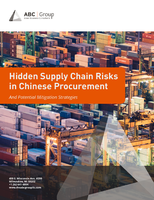ASTM announces approval of conductor tensile strength test method.
Press Release Summary:
ASTM B986, Test Method for Determination of Tensile Strength for Stranded Conductors by Mass Method, has been approved. It is designed for use in electronics and aerospace industries to validate tensile strength specification requirements for electrical conductors. Developed by subcommittee B01.02 on Methods of Test and Sampling Procedure, standard provides accurate way to determine tensile strength, according to Stephen Childers of IWG High Performance Conductors, Inc.
Original Press Release:
New ASTM Standard for Determining Tensile Strength of Electrical Conductors Approved
W. CONSHOHOCKEN, Pa. — ASTM B986, Test Method for Determination of Tensile Strength for Stranded Conductors by Mass Method, will be used within the electronics and aerospace industries to validate tensile strength specification requirements for electrical conductors.
ASTM B986 was developed by Subcommittee B01.02 on Methods of Test and Sampling Procedure, part of ASTM International Committee B01 on Electrical Conductors.
Stephen Childers, process engineer, IWG High Performance Conductors Inc., says that methods to determine tensile strength that rely on pulling individual strands from a completed conductor have limitations.
"Cross-sectional areas for a stranded conductor used in electronic applications can be difficult to determine," says Childers. "The use of a mass method provides an accurate and convenient means to determine tensile strength."
To purchase ASTM standards, visit www.astm.org and search by the standard designation, or contact ASTM Customer Relations (phone: 877-909-ASTM; sales@astm.org). ASTM International welcomes participation in the development of its standards. For more information on becoming an ASTM member, visit www.astm.org/JOIN.
ASTM International is one of the largest international standards development and delivery systems in the world. ASTM International meets the World Trade Organization (WTO) principles for the development of international standards: coherence, consensus, development dimension, effectiveness, impartiality, openness, relevance and transparency. ASTM standards are accepted and used in research and development, product testing, quality systems and commercial transactions.
For more news in this sector, visit www.astm.org/sn-energy or follow us on Twitter @ASTMEnergy.
ASTM Committee B01 Next Meeting: Oct. 23, 2013, October Committee Week, Jacksonville, Fla.
Technical Contact: Stephen Childers, IWG High Performance Conductors Inc., Inman, S.C., Phone: 864-472-0438; stephen.childers@iwghpc.com
ASTM Staff Contact: Kristy Straiton, Phone: 610-832-9640; kstraiton@astm.org
ASTM PR Contact: Barbara Schindler, Phone: 610-832-9603; bschindl@astm.org




